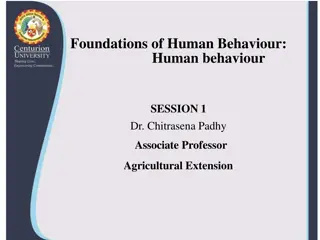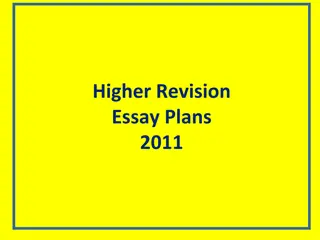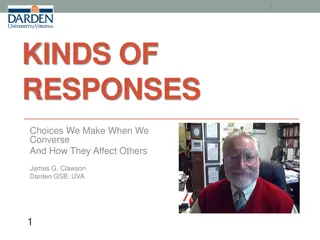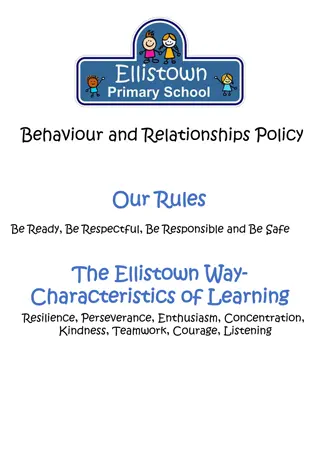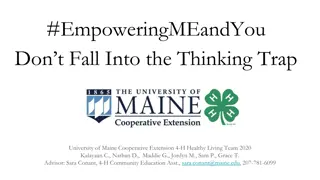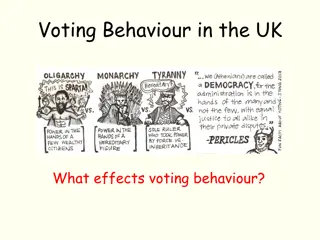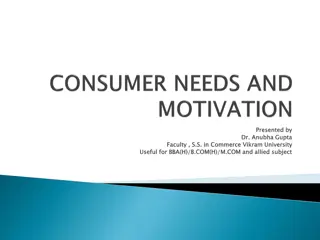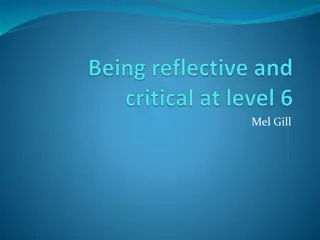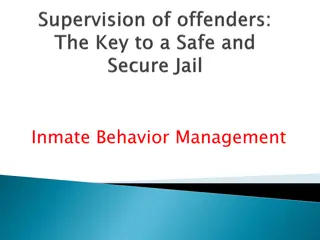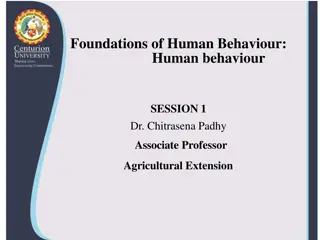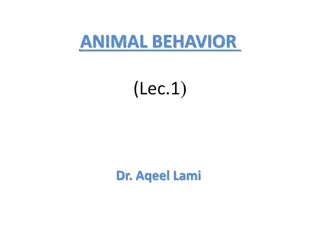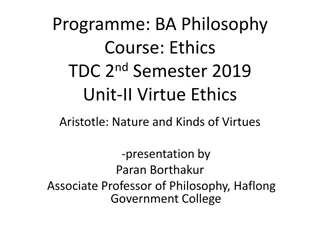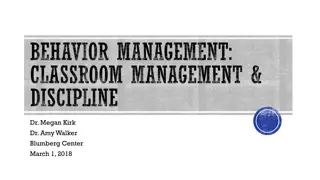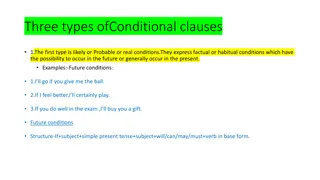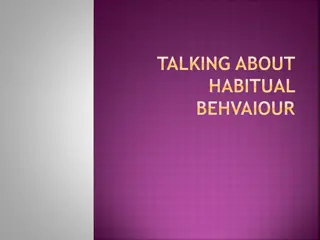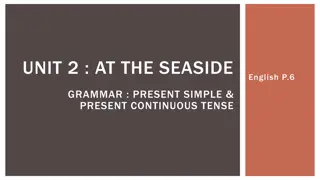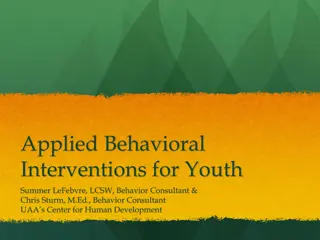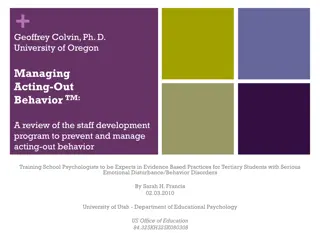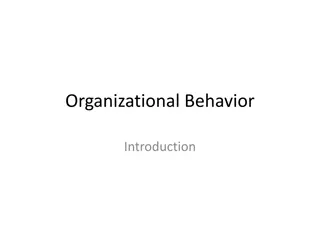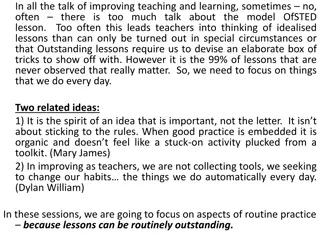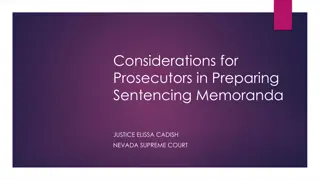Positive Behavior Support Interventions in Education
Learn about Tier 1 Positive Behavior Interventions & Supports (PBIS) developed by California State University and LA Unified School District. Explore evidence-based strategies like effective transitions, praise, choice-making, and establishing routines to promote positive behavior in students. Disco
1 views • 10 slides
Function Based Thinking
Function-based thinking in Missouri Schoolwide Positive Behavior Support, emphasizing data-based decision-making, mission clarity, and effective teaching practices. Understand how behavior is related to the environment and how environmental interventions play a key role in shaping expected behaviors
6 views • 27 slides
Addressing Predatory Behavior in the Fellowship
Predatory behavior, especially towards vulnerable members, is a concerning issue in the fellowship. This behavior includes unwelcome advances, exploitation of power dynamics, and institutional sexism. The discussion on predatory behavior necessitates honest dialogue and a united approach for a safer
3 views • 13 slides
Understanding Human Behavior: Foundations and Complexity
Human behavior encompasses the actions and interactions of individuals influenced by factors like genetics, culture, and situational contexts. It involves observable overt behaviors as well as hidden covert behaviors, with a dynamic interplay between individuals and their environments. Psychologists
8 views • 20 slides
Understanding Present vs. Past Tenses in English Grammar
Exploring the basics of present and past tenses in English grammar, covering affirmative, negative, and interrogative structures, as well as adverbs of frequency and quantity. Learn about describing general facts, habitual actions, and specific past events through detailed examples and visual aids.
8 views • 13 slides
GD Bart Puppy Test: Behavior Scoring System Overview
The GD Bart Puppy Test is a standardized behavioral scoring system designed for puppies at 8 weeks of age, focusing on 21 test components to predict success in canine behavior. Conducted by a team of 3 people, the test evaluates stress signals and responsiveness levels to various stimuli. Multiple e
6 views • 15 slides
Understanding the Role of Board-Certified Behavior Analysts in Supporting Students with Autism in PA School Programs
Pennsylvania Training and Technical Assistance Network (PaTTAN) plays a crucial role in supporting students with autism through the efforts of Board-Certified Behavior Analysts. The increasing number of students eligible for IEPs under the definition of autism necessitates skilled educators who can
0 views • 20 slides
Influencing Factors on Voting Behavior: A Comprehensive Analysis
In the realm of voting behavior, factors such as media, social class, age, gender, and more play critical roles. This essay delves into the complexity of factors influencing voting behavior, assessing their relative importance and the balance of their impact. The discussion includes models of voting
0 views • 12 slides
Understanding Responses in Conversations
Explore the impact of different types of responses in conversations and habitual patterns of speech. Discover how our choices in conversations, even those with ourselves, can shape our self-concept and self-esteem. Learn about the components of the self-concept and how they influence our interaction
0 views • 36 slides
Behavior and Relationships Policy at Ellistown Primary School
Ellistown Primary School aims to create a safe and respectful environment where everyone is ready to engage in learning. The Behavior and Relationships Policy emphasizes positive behavior reinforcement, clear boundaries, and promoting self-esteem. It focuses on fostering good citizenship, teaching s
0 views • 11 slides
Understanding Psychological Theories of Criminal Behavior
Psychologically-based criminologists attribute criminal behavior to individual factors such as negative early childhood experiences and inadequate socialization, leading to criminal thinking patterns and incomplete cognitive development. Probation and parole practices are influenced by rehabilitatio
0 views • 30 slides
Understanding Thinking Traps: Empowering Positive Thoughts
Habitual negative thought patterns, known as Thinking Traps or Cognitive Distortions, can lead to harmful beliefs like personalization, jumping to conclusions, all-or-nothing thinking, labeling, discounting the positives, and more. Recognizing these patterns is crucial for fostering healthier thinki
0 views • 10 slides
Understanding Voting Behavior in the UK
Voting behavior in the UK is influenced by various factors such as social class, age, location, single issues, party leadership, and media impact. Traditionally, voting behavior was predictable, but recent trends show a shift in party loyalty. Factors such as social class have historically played a
0 views • 26 slides
Understanding Consumer Behavior and Motivation in Purchasing Decisions
Consumer behavior refers to the process where individuals make decisions on purchasing goods and services. Motivation plays a crucial role in driving individuals to take action towards fulfilling their needs and desires. This motivation arises from a state of tension caused by unmet needs. Different
1 views • 14 slides
Understanding Consumer Behavior in Marketing
The design of a marketing program starts with understanding consumer behavior. Consumers, as the end users, play a crucial role in shaping market trends. Producers seek insights into consumer personas, market behaviors, and influencing factors. Management focuses on the consequences of consumer beha
2 views • 26 slides
Understanding Psychology: The Science of Behavior and Mental Processes
Psychology is the scientific study of behavior and mental processes. Psychologists study both observable behavior and private mental processes. The primary goals of psychology are to describe, understand, predict, and control behavior. Different branches of psychology, such as applied psychology, cl
2 views • 29 slides
Levels of Reflectiveness in Learning and Writing
Explore the levels of reflectiveness in learning and writing, starting from habitual actions to profound reflections. Understand the progression from providing material without meaning to critical analysis and personal interpretation. Discover the importance of relating concepts to experience and ch
0 views • 7 slides
Understanding Inmate Behavior Management in Correctional Settings
Inmate Behavior Management in correctional facilities involves supervising inmates, implementing corrective discipline, and fostering a fair and consistent environment. It emphasizes the importance of behavior management plans, identifying undesirable traits in supervision, and passing educational a
0 views • 19 slides
Understanding Human Behavior: Foundations and Factors
Human behavior is a multifaceted subject influenced by genetic makeup, culture, and individual values. It encompasses both overt actions and covert thoughts, a product of the individual and environmental factors. Psychologists study behavior from visible (overt) actions like playing football to inne
0 views • 20 slides
Understanding Normal and Abnormal Behavior: Perspectives and Definitions
Normal behavior varies from person to person and society, influenced by individual preferences and societal norms. Abnormal behavior is characterized by an inability to function effectively or personal discomfort. The concept of normality and abnormality in psychology raises complex questions about
2 views • 8 slides
Understanding Divorce and Domestic Abuse Laws
This content discusses topics such as divorce, property division, agreements, grounds for divorce, and spousal domestic abuse. It explores cases like Roley v. Roley, Rankin v. Rankin, and Outz v. Outz to illustrate legal aspects related to marriage dissolution and domestic abuse. The discussion incl
0 views • 19 slides
Understanding Human Behavior: Insights for Social Workers
This material delves into the intricacies of human behavior, exploring factors influencing behavior such as heredity, environment, intelligence, needs, and motives. It covers the concept of human behavior, stages in life from conception to old age, and theories of human development by eminent psycho
2 views • 71 slides
Understanding Animal Behavior and Ecology
Animal behavior encompasses a range of activities such as feeding, breeding, and social interactions. Ethology focuses on studying behavior in natural environments, while behavioral ecology examines ecological aspects like predator-prey interactions. Sociobiology delves into the evolution of social
3 views • 5 slides
Aristotle's Virtue Ethics: The Nature and Kinds of Virtues
Aristotle's virtue ethics discusses the nature of virtues as a disposition unique to humans that enables them to function well according to reason. Virtue involves finding the mean between excess and deficiency, not endorsing mediocrity. It emphasizes that virtues are acquired through habitual pract
1 views • 18 slides
Understanding Behavior Management in Classroom Settings
Explore the essential topics of behavior management, classroom strategies, and discipline in educational settings. Delve into the functions of behavior, impact of trauma on learning, and effective management techniques. Learn how to identify underlying reasons for student behaviors, discuss behavior
0 views • 76 slides
Types of Conditional Clauses and Examples
This article explores three types of conditional clauses - likely conditions, unreal conditionals, and impossible conditionals - with examples and structures for each type. The first type involves factual or habitual conditions likely to occur in the future or present. The second type deals with hyp
0 views • 8 slides
English Verb Tense Review: Simple Present and Simple Past
Simple Present Tense is used for habitual actions, unchanging truths, and general statements of fact. It is indicated by words like always, usually, and sometimes. Simple Past Tense is used for completed actions and past habits indicated by words such as yesterday and last night. The forms and indic
0 views • 46 slides
Understanding Present Continuous Tense in English Grammar
Explore the present continuous tense in English grammar through examples and explanations. Learn how to form positive, negative, and question sentences in this tense, as well as common uses such as actions happening now, future plans, temporary situations, and habitual actions. Enhance your grasp of
0 views • 50 slides
Targeting Emotions to Facilitate Behavior Change in Older Adults
Efforts in changing health behavior have traditionally focused on social and cognitive factors, but recent evidence highlights the importance of affective states in decision-making and behavior change. Janey Peterson discusses the role of emotions in achieving and sustaining behavior change to benef
0 views • 11 slides
Grading Criteria for Effort and Behavior in Educational Reporting
Effort and behavior in educational settings are evaluated based on criteria ranging from Excellent to Causing Concern. Pupils demonstrating excellent behavior show respect, responsibility, and positive engagement in learning. Those with good behavior exhibit cooperation and respect for others, albei
0 views • 9 slides
Understanding Habitual Behavior Through Different Tenses
Exploring habitual behavior through various tenses - present simple, simple past, continuous present, and more. Examples illustrate repeated actions, annoying habits, and states in the past. Learn how to express habits and typical behaviors in English.
0 views • 4 slides
Learning Present Simple and Present Continuous Tenses at the Seaside
Explore the usage of present simple and present continuous tenses through examples and exercises related to everyday activities at the seaside. Understand how to form sentences in these tenses and differentiate between them based on ongoing actions or habitual activities. Practice completing sentenc
0 views • 51 slides
Understanding Applied Behavior Analysis (ABA) for Youth Interventions
Applied Behavior Analysis (ABA) is a science focusing on improving human behavior by increasing desired behaviors, teaching new skills, and generalizing behaviors. ABA emphasizes observable behaviors, measurement of behavior change, and the use of interventions in various settings like classrooms an
0 views • 25 slides
PBIS Expectations and Behavior Flowchart
The PBIS flowchart outlines behavior expectations and interventions for minor and major incidents in a school setting. It covers disrespectful behavior, disruption, defiance, property damage, theft, possession of weapons, and more. The flowchart guides teachers and staff on managing and addressing s
0 views • 6 slides
Managing Acting-Out Behavior: A Staff Development Program Review
This review discusses a staff development program created by Geoffrey Colvin, Ph.D., from the University of Oregon, focusing on preventing and managing acting-out behavior in students with emotional disturbance or behavior disorders. The program includes video presentations, strategies for behavior
0 views • 22 slides
Understanding Organizational Behavior and Individual Behavior
Organizational Behavior (OB) is a multidisciplinary field that combines knowledge from various disciplines to study and manage organizations effectively. It emphasizes the application of this knowledge to enhance organizational effectiveness and the well-being of participants. OB is a useful concept
0 views • 38 slides
Function-Based Behavior Support Plans: A Comprehensive Guide
Explore the process of developing Function-Based Behavior Support Plans (BSP) using Functional Behavioral Assessment (FBA). Understand the concepts of function and functional behavior assessment, learn how FBA/BSP fits within a multi-tiered support system, and practice developing BSP for students. D
0 views • 74 slides
Understanding English Tenses - Present Tense Usage Explained
Dive into the world of English tenses with a focus on the Present Tense. Discover the uses of Present Tense including expressing habitual actions, universal truths, vivid narratives, and future events. Explore examples and explanations to enhance your understanding of this fundamental aspect of Engl
0 views • 7 slides
Rethinking Teaching Focus: Routine Practices for Outstanding Lessons
In the quest to enhance teaching quality, the emphasis often falls on the idealized model of lessons, overshadowing the significance of routine practice. Shifting the spotlight to everyday teaching habits, the focus is on fostering good practice organically rather than adhering rigidly to set rules.
0 views • 5 slides
Key Considerations for Prosecutors in Sentencing Procedures
Understanding sentencing memoranda, unique statutes, and the responsibilities related to mentally ill defendants, prosecutors must factor in crime details, criminal history, victim impact, mitigating factors, and additional penalties. The court's discretion in imposing deadly weapon enhancements and
0 views • 9 slides



